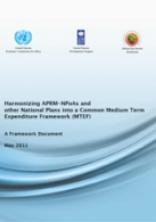Harmonizing APRM-NPoAs and other National Plans into a Common Medium Term Expenditure Framework

Under the auspices of the New Partnership for Economic Development (NEPAD), the African Peer Review Mechanism (APRM) was launched in March 2003 as a selfmonitoring instrument voluntarily acceded to by member States of the African Union. The mechanism has been described as ‘Africa’s Innovative Thinking on Governance’ and it is seen as a double contract between African governments and their citizens, on the one hand, and between Africa and its development partners, on the other. Above all, it provides a forum that speaks with an African voice to Africans, thereby enhancing ownership of the debate about development policy, human security and governance issues.
So far, many of the acceded countries have conducted successful governance self assessments, which resulted in the Country Review Report and a National Programme of Action (NPoA). The NPoA intends to address the deficiencies and challenges revealed during the self-assessment. However, experiences from the APRM pioneer countries suggest that the NPoA is the weakest link in the process and the real challenge is its effective implementation. Initial studies by the UNECA, UNDP and the African Development Bank explored the key challenges to successful NPoA formulation and implementation.